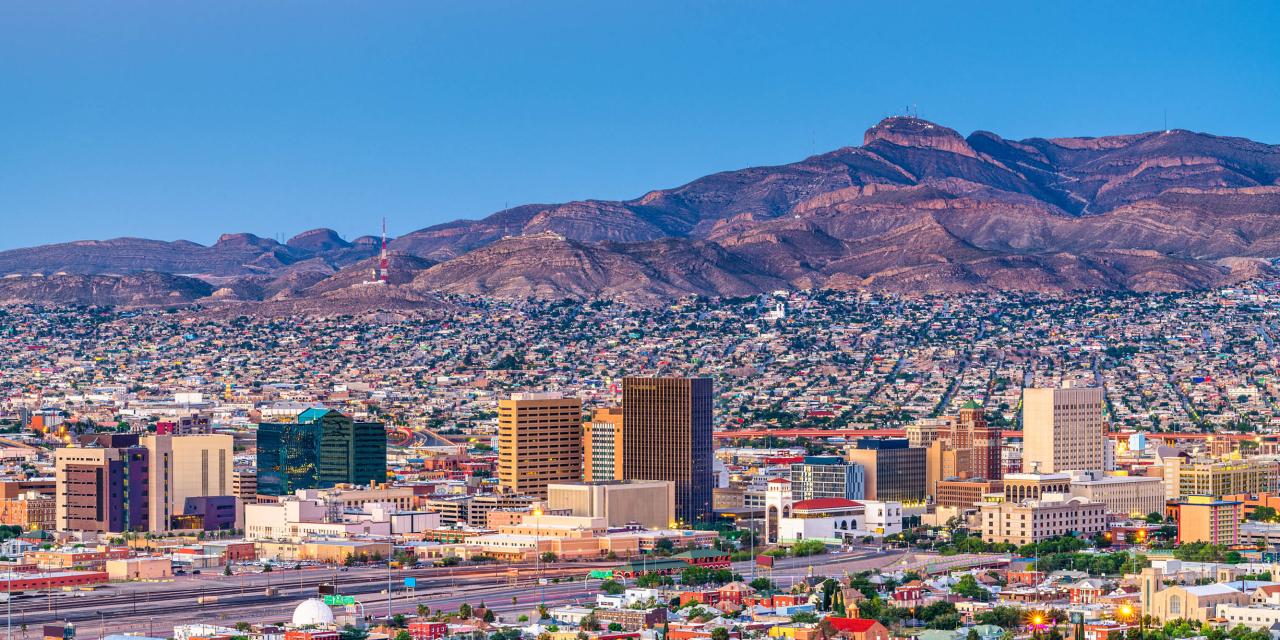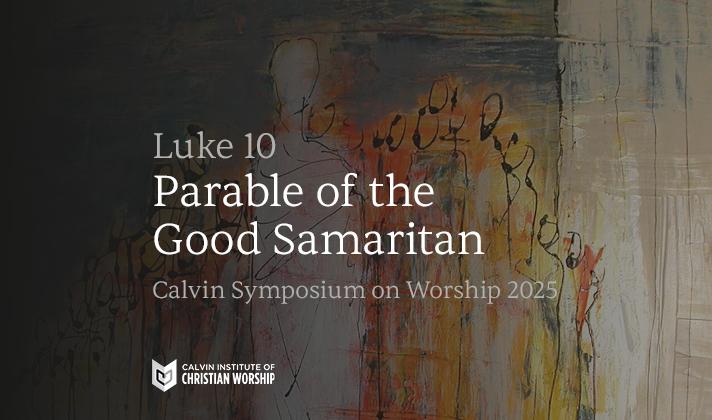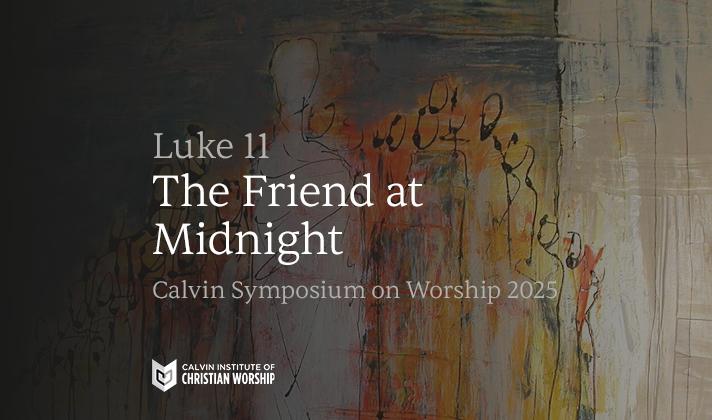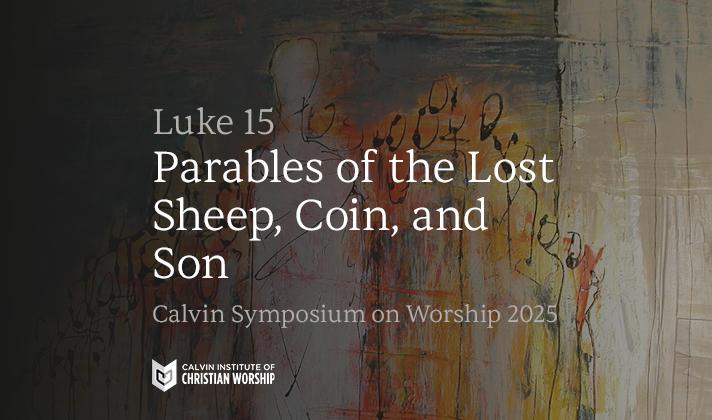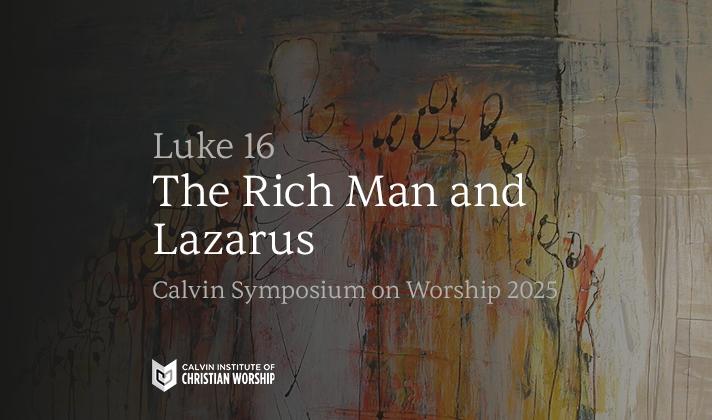Blessed are the Poor in Spirit
Song: “Blessed Are the Poor”
Text: Adam M. L. Tice © 2021 GIA Publications, Inc.
Music: Kate Williams © 2021 GIA Publications, Inc.
All rights reserved. OneLicense.net A-703303.
Call to Worship and God’s Greeting
Led by Kate Williams
Song: “He Is Among Us”
Text and Music: Paul Zach, Isaac Wardell, Orlando Palmer, Andy Piercy, John Swinton © Integrity Music, Paul Zach Publishing
Used by permission. CCLI #400063.
Prayer of Confession and Assurance of Pardon
with “Have Thine Own Way, Lord”
Text: Adelaid A. Pollard
Music: George C. Stebbins, 1907; arr. Larry Visser © 2021 Larry Visser
Led by Larry Visser and Peter Jonker
Song: “Father, Let Your Kingdom Come”
Text and Music: Ben Cooper, Latifah Alattas, Liz Vice, Paul Zach, Madison Cunningham, Orlando Palmer, and Isaac Wardell © 2017 Porter’s Gate Publishing, Porter’s Gate Publications, and Hymns from The Porter’s Gate
Used by permission. CCLI #400063.
Prayer for Illumination, Scripture Passage, Sermon, and Prayer of Application
Matthew 5:3 (full text below)
Led by Rodrigo Cano
Song: "A Refuge of the Weary Saints"
Text: Psalm 46; Isaac Watts and Elise Massa
Music: Elise Massa © 2021 Elise Massa
Used by permission.
Led by Elise Massa
Winner of the Church of the Servant 2021 New Psalm Contest, in memory of Ben Fackler
Prayer
Led by Uzouku Williams
Song: “See How Good It Is”
Text and Music: Psalm 133, Wendell Kimbrough and Sandra McCracken © 2021 Wendell Kimbrough, Integrity Worship Music and Paper News Publishing
Used by permission. CCLI #400063.
Blessing
Led by Uzouku Williams in Igbo
Sermon by Rodrigo Cano
Would you join me in prayer?
God our helper, by your Holy Spirit,
open our minds that as the scriptures are read and your Word is proclaimed,
we may be led into your truth and taught your will,
for the sake of Jesus Christ our Lord. Amen.
Today we are going to be reading from Matthew 5:3, and this is how it reads:
“Blessed are the poor in spirit,
for theirs is the kingdom of heaven.”
This is the Word of the Lord!
Imagine having the opportunity to get advice from someone who is the very best in their field, at the top of their game. Who would that be in your context?
For example, I am thinking if I want to receive some investment advice, who would be the person that I would go to? Well, in my mind, I would probably go to Warren Buffet. His net worth is billions and billions of dollars. I’d say Warren Buffet would be a wise person to get to know for investments.
Or are you already thinking about your summer? You’re tired already of winter and thinking about your summer, your Fourth of July. And you want to get better at cooking. What chef would you go to? Who would you reach out to? I would probably go to Gordon Ramsey. And I know there’s going to be a lot of yelling in between, and trust me, I am not a good cook.
Or let’s think about sports. If you wanted help getting better at sports—let’s think about basketball. Who would be the best one to give you advice on that? Who would you go to? Now, regardless of who you are thinking of right now, we are required in the state of Illinois by law to say that you would go to Michael Jordan.
But the reason I mention these people who are at top of their game is because Jesus at the moment that he is about to start what we know as the Sermon on the Mount—he’s about to teach the Sermon on the Mount—he’s starting to get noticed, and people want to hear what he has to say. People want to hear, want to know what he has to say.
We see in a few verses before (this that) Jesus had been teaching. And the Bible tells us that he was in Galilee, and he had been teaching in the synagogue, and he’s proclaiming the good news of the gospel. He is saying that the kingdom of God has come near! And so he’s healing people, he’s feeding people—he’s doing a lot of great things. And scripture tells us that people from all over were starting to follow Jesus. Once again, they want to know what he has to say.
And it is then when the Bible says that Jesus sees the crowds, so he goes to the mountainside, and he begins to teach.
Now, what the people in the crowd did not know is that what they were about to hear were some of the most countercultural declarations of what it means to be blessed and what it means to follow Jesus. Because at the heart of their curiosity and at the heart of what they wanted to hear, they wanted answers to their questions.
They wanted to know: if this man is saying that the kingdom of God is so good, and it’s here, if the kingdom of God he’s proclaiming is now here, and it is so good, as he is saying, then there are a couple of questions that people wanted to be responded (to). These questions are: what does this kingdom actually look like, what does this kingdom really look like? But I think the most important question that they were asking is: how do I get in? How do I get into this kingdom?
After being cast away by the Roman Empire, only a few religious people seem to have it all together. People knew that it was impossible to follow the law, and there's a constant sense of not being able to fit in, not being able to fulfill what they’re supposed to do. And at this moment, when Jesus comes and proclaims the good news, people want to know: what does this kingdom really look like, and the question really that they’re asking is: how do I get in?
Our Current Reality
Today we live in our culture that is influenced by so many factors. People go after power and fame and money and status. The result of this is that we have the “haves” and the “have nots.” We have the insiders, and we have the outsiders. We are in a constant need to fit in and to be “successful.”
In this culture, the culture tells us that all we have to do is to really work hard, that if you work hard you’re going to be able to get anything that you want. And even though I know that we are living in a tension right now of a post-Christianity culture but also a lot of people who are coming, immigrants who are coming to this country and bringing their own beliefs and bringing their own religion and trying to navigate the reality of all of this, this tension in which we are right now, and even during and after COVID, people are asking questions; people are looking for answers. I think that a lot of people are also asking that question, and the question they’re asking (is): if this kingdom of God is real, if this kingdom of God that Christ-followers have been proclaiming is real, what does that look like? But the question that people keep asking today is: How do we get in? What do I have to do to get in? What do I have to do to earn this? What do I have to do to be able to be part of this?
Jesus Offers the Solution
Those who are in the crowd cannot believe what Jesus is saying. Jesus is setting the base for (what) he is about to say. He’s going to say a lot of things for the rest of what we know as the Sermon on the Mount. He begins by saying: “Blessed.” You are blessed, you are happy, if you are poor in spirit, because this kingdom that I am proclaiming, this kingdom that I am telling you about, belongs to those who can associate with that. If you’re poor in spirit, this kingdom is for you.
And I know that what Jesus is saying is basically disarming the crowd because the religious system that they had been exposed to, it was just a back-breaker. The bar for what it took to get God’s favor, to receive the benefits of God, was just incredibly high. It had so many hoops and jumps that you had to go through. And now Jesus is breaking the mold, and he’s talking that it’s a blessing and something that might seem contradictory. He’s talking about a blessing and being poor at the same time. Blessing and poor in spirit? How does that even work?
The Solution Today
Because of where I’m pastoring right now, I have the blessing and the opportunity to talk to a lot of pastors, not only here in the United States but also around the world. This past fall I met a pastor who is in India. He was interested in learning some of the materials that we have in terms of leadership development to take it to India. He wants to start microchurches; that’s something we’re doing here also in our church. And he tells us that he is in a very poor area of India, and COVID had hit that area tremendously. And people have different religious backgrounds, but he was telling me how releasing and how freeing the gospel has been for them, has become to them. He talks about how people there accept the fact that they do not have to have something to offer, they don’t have to do something to earn it, they don’t have to accomplish anything, that they can freely receive the gift of the kingdom by simply recognizing that all of this is by grace. In the time that we’ve met, he has trained over twenty leaders and he's planted fifteen microchurches of about twenty people each, twenty to twenty-two people each.
Now, why do I share this? Well, because I believe that in other parts of the world people understand what it means to be poor in spirit. People understand what it means to follow God in that way. But here sometimes in the United States or in the Western world, it is so hard to accept that. It is so hard to accept that we can receive the gift of the kingdom when we are poor in spirit. Because once again we’ve been told over and over again that we need to try harder, that we need to work harder, that we need to learn more, to have something to offer. And that’s why this good news of what Jesus is saying in this first part of the Beatitudes is so important for us.
Let me just ask you this question: If you are leading anything, if you’re a leader, maybe you’re in this conference and you’re trying to learn something because you want to take it back to your congregation, if you’re a leader, if you’re leading anything, if you’re a senior pastor or leading a ministry, let me ask you this question. In the last eighteen to twenty months—think about this, and let me ask you this question—how many times have you felt the need to do more? How many times have you felt that if I just do a little bit more maybe things will get the way that I want them to get? How many times have you felt the need to perform, to really perform? How many times have you felt the need to have it all together?
The reason why I ask this question is because I have been there, and I know that you have been there if you are leading anything. But it is in these moments when I can rest in knowing that I have grace extended to me. This is in the moments that I know I am blessed when I am poor in spirit, that my belonging to God, that his love for me, that my belonging to his kingdom does not depend on my performance, it does not depend on how many people are seated or how many people are watching online or how many people are coming, but it’s only in the grace that he has willingly given to you and to me in Jesus Christ.
And when we ask this question, maybe you’re thinking, “yeah, OK, now I’m trying to understand” the poor in spirit receive the kingdom of God and they’re blessed, but what does it even mean to be poor in spirit? Well, a few things, different things. Number one is when we feel like we have nothing to be proud of spiritually, when we say, “oh, the spiritual disciplines, I have them all.” No, when we have a humble position. The “poor in spirit” are people who are profoundly aware of their shortcomings and failures before God. The “poor in spirit” would never say they are on God’s good side because they are so good or they are pretty good people. The “poor in spirit” would never say that God was for them because they do lots of nice things and they do a lot of things in the church. The “poor in spirit” would never think they were OK with God just because they never intentionally hurt anyone. The “poor in spirit” never claim to have anything about themselves that puts them on good terms with God. The “poor in spirit” is someone who recognizes that we have nothing to offer, that we have nothing to give, but it’s because of God’s grace that we can receive the gift that he gives us.
Jesus goes on to say some very amazing things in the next few verses and chapters. And even though these first verses are very comforting, what comes next, Jesus sets the bar really, really, really high of what it means to be blessed and what it means to follow him. But I think what Jesus is doing, what Jesus is trying to do is to help us come to grasp, help us realize that there is no way that we can accomplish this on our own, that there is no way that we can accomplish any of what Jesus is saying. But Jesus is stating, is giving the example of what it means to do that because Jesus himself emptied himself of his glory, of his power, and he became poor, he became poor in spirit, he came to be one of us, . . . and give us through that price that he paid, to give us freedom, to give us salvation, to give us the gift that he has for us, and he reminds us that it is in those times when we can recognize that the kingdom of God is for us not because of our performance, but because of what he did for us on the cross.
We are still at the beginning of the year, and only God knows what the future holds. Just when we think that we are having some breakthrough, something else happens and we have to go back to the drawing board and really, really rethink some of the many things we’re doing. So what is my challenge to you, my encouragement to you? Number one is: Would you extend grace to yourself? Would you receive the grace that God has for you? Look into your life, look into the last twenty months, and just be free: be free from any pressure, from any stress, from any unrealistic expectation to perform. “If I can only get it altogether with things sometimes . . .”—you’ve got to say no. It is in those moments that you recognize that you have nothing to give, you have nothing else, that (God) is glorified in your life, because when you are weak then (God is) strong. And number two challenge: Let’s do the same with others. Let’s extend grace to other people. Let’s share the grace that God has for us, and let’s share it with other people. This is so important in these times.
Prayer of Conclusion
I want to close this time by praying, but I want to pray what the Heidelberg Catechism says in Day 1. This has been something that’s been in my mind for these past few months, for these past eighteen months, and I love what it says, and I know you know it, but let’s read it together. This is what it says:
What is your only comfort in life and in death?
That I am not my own, but belong—body and soul, in life and in death—
to my faithful Savior, Jesus Christ.
He has fully paid for all my sins with his precious blood,
and has set me free from the tyranny of the devil.
He also watches over me in such a way
that not a hair can fall from my head without the will of my Father in heaven;
in fact, all things must work together for my salvation.
Because I belong to him, Christ, by his Holy Spirit, assures me of eternal life
and makes me wholeheartedly willing and ready from now on to live for him. Amen!
